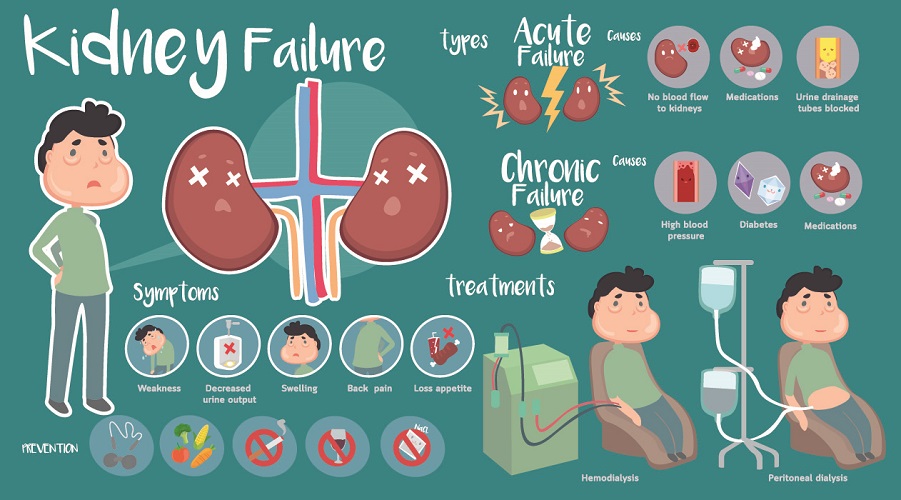What is Kidney Failure?
Kidney failure is the final stage of chronic kidney disease. It is also called end-stage renal failure (ESRD). It is a condition in which the kidneys cannot function long enough to enable survival without dialysis or kidney transplantation.
The kidneys are a pair of organs located symmetrically on both sides of the spine, at waist level and closer to the back.
Its main function in the body is to filter the blood passing through it and remove toxins and harmful substances from the body. The waste produced during the kidney purification process goes to the bladder. And they are excreted from the body during urination.
Apart from this, the kidneys also balance the body’s water level. It produces the active form of vitamin D. It plays a role in the production of red blood cells. And it is among the mechanisms that control blood pressure.
Kidney failure occurs when the kidneys lose their ability to adequately filter toxins from the blood.
If the kidneys do not do their job regularly, the body becomes overloaded with toxins. If left untreated, this condition can lead to life-threatening kidney failure.
What is Acute Kidney Failure?
If kidney functions weaken in a short time and as a result creatinine, blood urea nitrogen and other uremic toxins begin to accumulate in the body, the presence of acute Kidney failure may be present. If the amount of urine decreases in acute Kidney failure, this condition is called oliguria. For oliguria to occur, the amount of urine must be less than 400 ml per day.
What is Chronic Kidney Failure?
Chronic renal failure progresses insidiously in the early stages. And it does not cause any serious symptoms in the person’s body.
- Fatigue,
- Confusion,
- Nausea,
- Frequent urination, especially at night
- Swelling in hands and feet,
- Chest pain,
- These may include shortness of breath and vomiting in advanced stages.
Since the disease progresses gradually in chronic kidney failure, it is difficult to make an early diagnosis.
The kidneys gradually lose their functions. It begins to decrease in size.
What are The Types of Kidney Failure Diseases?
There are 5 types of kidney failure that have been identified.
-
Acute Prerenal Renal Failure:
This type causes kidney failure when there is insufficient blood flow to the kidneys. The kidneys cannot filter out toxins because there is not enough blood flow. Thus, acute prerenal renal failure occurs.
-
Acute Intrinsic Kidney Failure:
It occurs due to direct severe injuries or trauma to the kidneys. It may occur due to excessive load on the kidneys and resulting oxygen deficiency. Severe bleeding, shock, blockage of blood vessels in the kidney, and glomerulonephritis (inflammation of blood vessels in the kidney) can cause acute intrinsic kidney failure.
-
Chronic Prerenal Kidney Failure:
The kidneys become smaller due to the slowing down of blood flow to the kidneys for a long time. And it loses its function.
-
Chronic Intrinsic Kidney Failure:
It occurs when long-term damage to the kidneys occurs due to intrinsic kidney disease. Intrinsic kidney disease occurs due to direct trauma to the kidneys, such as severe bleeding or lack of oxygen.
-
Chronic Post-Renal Kidney Failure:
The pressure caused by long-term obstruction of the urinary tract causes kidney damage. Thus, this type of kidney failure occurs.
What are The Stages of Kidney Failure?
Kidney diseases have certain stages. These stages start off mildly.
It can progress to the final stage.
Among the mentioned phases;
-
First Stage:
The stages of kidney dysfunction are quite mild in the first stage. In this stage, where there are little or no symptoms, there is mild kidney damage. A healthy lifestyle can be continued and the disease can be easily prevented at this stage if detected.
-
Second Stage:
In the second stage of kidney diseases, the damage is a little more obvious. Pain, protein in the urine, and tissue damage in the kidneys may occur. At this stage, lifestyle adjustments should be made and medical help should be sought to prevent it.
-
Third Stage:
Kidney dysfunction stage 3 can be detected depending on the amount of waste products. At this stage, the symptoms are noticeable.
And the pain increases. While there is a lot of swelling in the feet, frequent urination may be observed. Lifestyle should be regulated and treatments should be started under the supervision of a doctor.
-
Fourth Stage:
Stage 4 of kidney failure is quite severe.
At this point, where the symptoms are felt most severely, problems such as high blood pressure or anemia may be encountered.
At this stage, it is vital to consult a doctor and receive treatment.
Compliance with treatment, following a diet and adopting a healthy lifestyle are the conditions that must be followed for patients with kidney dysfunction who have reached stage 4.
-
Fifth Stage:
The symptoms of end-stage kidney failure are quite severe. In the fifth stage, the kidneys are close to losing their function. Completely absent or underfunctioning kidneys cause many symptoms to occur frequently.
End stage symptoms of chronic kidney failure; While vomiting, nausea and shortness of breath occur, the quality of life decreases significantly during this period. Kidney damage in the end stage can be treated with kidney transplantation or regular diabetes.
What are The Causes of Kidney Failure?
There are two types of kidney failure: acute and chronic. The conditions that cause both types of kidney failure are different.
-
Causes of Acute Kidney Failure
Acute kidney failure occurs due to many reasons. They may cause obstruction of the Kidney vessels (thrombosis, embolism), inflammation of the Kidney vessels (vasculitis), hemolytic uremic syndrome, thrombocytopenic thrombotic purpura, and disseminated intravascular coagulation, acute Kidney failure.
In addition, causes such as excessive blood loss as a result of injuries, dehydration for a long time, fluid loss due to diarrhea and vomiting, being under rubble for a long time and severe burns can also lead to acute kidney failure.
-
Causes of Chronic Kidney Failure
- The most common causes of chronic kidney failure are;
- Diabetes (diabetes mellitus)
- High blood pressure
- Chronic glomerulonephritis
- Polycystic kidney disease
- Chronic pyolelonephritis
- Long-term use of painkillers
- Smoking
- Excessive weight
What are The Symptoms of Kidney Failure?
Kidney damage may not always show obvious symptoms, but there are symptoms that may occur. Among the symptoms of kidney dysfunction, where symptoms begin to increase as it progresses;
Early Symptoms of Kidney Failure
- Decrease in Urination
- Shortness of Breath
- Swelling in Legs and Ankles
Symptoms of Advanced Kidney Failure
- Decrease in Urine Amount
- Drowsiness
- Tiredness
- Nausea
- Blurring of Consciousness
- Chest Pain
- Seizures
- Coma
It is among the symptoms of kidney dysfunction that may be seen. However, as we mentioned above, these symptoms may not appear in everyone. Generally, the presence of kidney dysfunction can be detected by following the early symptoms.
Diagnosis of Acute
Depending on the cause of your acute kidney injury, your doctor will perform different tests if they suspect you may have acute kidney failure.
It is important that acute kidney failure is discovered as soon as possible because it can lead to chronic kidney disease or even kidney failure. It can also lead to heart disease or death.
-
Measuring Urine Output:
Your doctor will want information about how much you urinate each day to help find the cause of acute kidney failure.
-
Urine Tests:
Your doctor will test your urine (urinalysis) to look for signs of kidney failure.
-
Blood Tests:
To evaluate kidney function, in addition to protein tests, blood tests should be performed to help determine creatinine, urea nitrogen phosphorus and potassium levels.
-
GFR:
Your blood test will also help you find out your GFR (glomerular filtration rate), which is a marker of declining kidney function.
-
Imaging Tests:
Imaging tests, such as ultrasound, can help your doctor see your kidneys and look for abnormal conditions.
-
Kidney Biopsy:
In some cases, your doctor will perform a biopsy, in which a small piece of your kidney is removed with a special needle and examined under a microscope.
Diagnosis of Chronic
-
Blood Tests:
Complete blood count provides important clues in the diagnosis of Kidney failure. The creatinine and urea levels in the blood inform the doctor about the presence of kidney failure.
-
Urine Test:
The presence of blood or protein in the urine may indicate problems with the kidneys.
-
Measurement of Urine Volume:
Determining urine output can help diagnose this disease.
-
Views:
It helps diagnose the disease by imaging the kidneys and urinary tract.
-
Biopsy:
Kidney biopsy is usually performed under local anesthesia by inserting a long and thin needle under the skin.
What are The Treatments for Kidney Failure?
Treatment of Acute
Treatment for acute kidney failure usually requires hospitalization. Most people with acute kidney injury are already in the hospital for another reason.
How long you stay in the hospital depends on the cause of acute kidney failure and how quickly your kidneys heal.
In more severe cases, dialysis may be required to help kidney function until your kidneys recover.
Your doctor’s main goal is to;
It is to treat the underlying cause of your acute kidney injury. Your doctor will work to treat all of your symptoms and complications until your kidneys heal.
After you have acute kidney failure, you have a higher risk of having other health problems (such as kidney disease, stroke, heart disease) or having acute kidney failure again in the future.
To protect yourself, you should contact your doctor to monitor your kidney function and recovery.
The best way to reduce the risk of kidney damage and preserve kidney function is to prevent acute kidney injury or diagnose and treat it as early as possible.
Treatment of Chronic
Treatments can be planned for complications experienced during kidney failure.
-
Blood Pressure Control:
Patients with kidney failure often have high blood pressure problems that are difficult to control. A nephrologist may prescribe medication for high blood pressure to preserve kidney function. Since high blood pressure medications can initially reduce kidney function, it is beneficial to have frequent checks.
-
Control of Cholesterol Level:
Patients with kidney failure generally have bad cholesterol levels that increase the risk of heart disease. Cholesterol medications can be used for this.
-
Anemia Drugs:
In cases of anemia, anemia medications can be used.
-
Treatments for Fluid Accumulation:
People with chronic kidney failure may experience fluid accumulation in their body. Medicines that prevent this condition can be used during the treatment process.
-
Low Protein Diet:
In order to reduce the burden on the kidneys, a low protein diet is important in reducing the problems that may occur.
Treatment of end-stage Kidney disease comes in two ways:
-
Dialysis:
The process of cleaning the blood, which kidneys that do not function properly, cannot do, is carried out with the help of a device.
Dialysis does not cure kidney failure.
However, in order to survive, dialysis must be performed at regular intervals.
Dialysis can be performed in two ways:
Hemodialysis or peritoneal dialysis, depending on the patient’s condition.
-
Kidney Transplantation:
It is the transplantation of a functioning kidney instead of a non-functioning or poorly functioning kidney.
Although there is a long waiting list for kidney transplants from cadavers, kidney transplants are performed in a short time in living-to-living kidney transplants.
After kidney transplantation, patients do not need to undergo dialysis.






